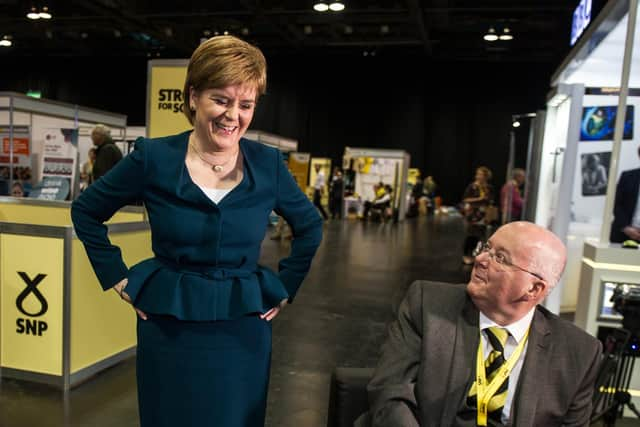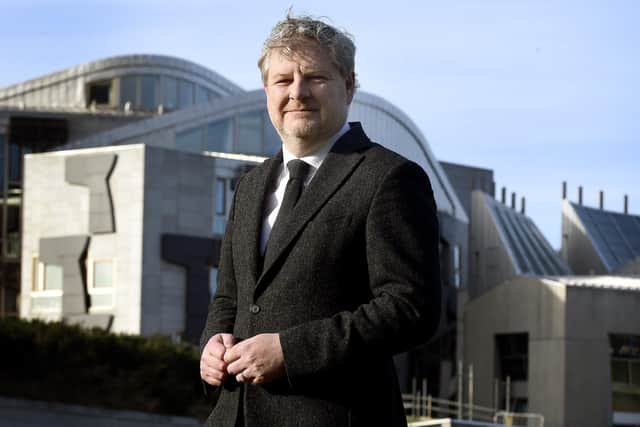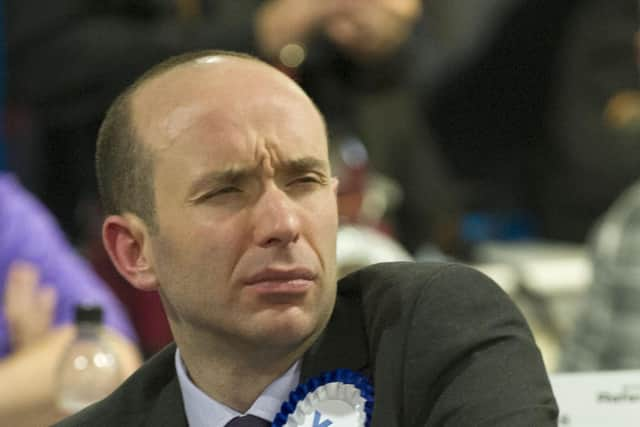Insight: The inside story of the fierce internal battles raging in the SNP


There was a short Twitter spat last week which, if you had blinked, you may have missed, but which perhaps epitomises the current rancour swirling around and within the ranks of Scotland’s ruling party.
Marco Biagi, a former MSP who is running to be selected as a candidate in next year’s Holyrood elections, had produced a rather witty spoof of an advert, known as “the cereal woman”, which was originally run by the Better Together campaign back in 2014.
Advertisement
Hide AdAdvertisement
Hide AdThis time though, the character was an independence supporter, and what’s more her husband had switched to porridge and was backing Biagi for selection in the Edinburgh Central constituency.


The ad provoked cross-party laughs, yet there was one person who was decidedly unamused: SNP MP Stewart McDonald. He declared the ad was “devious and dishonest”. Biaigi was initially bemused by the reaction, but ultimately tweeted to McDonald “cease and desist… I use those words very deliberately”. With the apparent threat of legal action, McDonald’s tweet was deleted.
It was a strange moment, even by Twitter standards. Why would two young, ambitious men of the same party, with the same hopes for an independent Scotland, be at loggerheads over a spoof ad?
For those reading the room, it was obvious: McDonald is backing Angus Robertson, former Moray MP and former SNP Westminster leader, for the Edinburgh Central seat. Biagi is his main competition.


The constituency, which is home to the Scottish Parliament, has become a cipher for the internal woes of the SNP; encompassing the three major strands of division which are pitting former “indymates” against one another, even if, as one potential candidate says, not all the same people align along the same side of each argument.
The splits are such: those who believe the party, and indeed Nicola Sturgeon in particular, treated Alex Salmond poorly when he was accused (and later cleared in court) of sexual harassment and worse, and those who most definitely do not; those who back the party’s policy on reforming the Gender Recognition Act to allow “self-ID” for transgender people and those, including many of the party’s senior women, who don’t; and the eternal party divide between the gradualists for independence and those who want to see a route map and a Plan B for when Boris Johnson again refuses a Section 30 Order for another referendum.
Of course division in political parties is par for the course, but the SNP has, in recent times, been more successful than most at damping down any public dissension. Without doubt the current selection process for next year’s Holyrood elections, and the way the party is handling it, has changed all that.
The Edinburgh Central seat was lost by the SNP at the last Holyrood election to the former Conservative Scottish leader Ruth Davidson (it had been held by Biagi from 2011 though he didn’t contest it again in 2016) and there is a deep belief among members that it can be won back - and being the person who won it from the Tories would be a feather in the candidate’s cap. Selection was always bound to be competitive.
Advertisement
Hide AdAdvertisement
Hide Ad

Angus Robertson was the first to declare he would stand. An Edinburgh man, he grew up in the seat, and although he had represented Moray in Westminster, felt it was time to be closer to home. But there was a Joanna Cherry-shaped spanner in the works. The MP for Edinburgh South West declared she too would stand for selection. It was a move that the Robertson camp had not expected.
Cherry, who is famously “not close” to the party leader Nicola Sturgeon, unlike Robertson who is considered an ally, is nonetheless popular among members of the constituency, where she lives. She also had the scalp of the Prime Minister on her belt after winning the prorogation judicial review and has very specific, and somewhat challenging-to-the-leadership views on what the party should do to gain independence. Further, she had been a loud critic of the party’s policy on gender reform - a policy Robertson champions.
Then things got more interesting. A sudden rule change was handed down by the party’s National Executive Committee which blocked Cherry from standing - unless she gave up her Westminster seat first.
Cries of “fix” from members were loud, but Cherry withdrew, later claiming she had been “hobbled” by the party. Unexpectedly, Biagi threw his hat in the ring, and a whole new contest was on.
“It has been vicious to be honest,” says one constituency party member.
“People like Angus, he’s very personable and they respect his abilities, but they also like Marco and know him from his time as MSP before, and it doesn’t feel like he’s parachuting into the constituency.
“There are also a lot of people very unhappy with the way the party interfered to block Joanna from standing. It was unnecessary and cack-handed and unfortunately for Angus that has rebounded on him with many folk thinking it was done to try and ensure he won. It’s easy to see why they would think that.
“People are really upset by what’s gone on, feeling they’ve been manipulated. It’s not what our party’s about.”
Advertisement
Hide AdAdvertisement
Hide AdAnother local member said that they had been “appalled” at the NEC’s decision, but believes that Biagi could provide some unity.
“On the one hand it’s great that we’ve so many people wanting to represent Edinburgh Central, and there are two other candidates who nobody ever focuses on, but the way it’s been handled by party officials has left a bad smell. I hope that Marco wins so we can move away from the divisions.”
Biagi himself has said he believes the decision to change the rules was “naive rather than malicious”, and he has also thrown his hat in the ring to be the SNP’s new National Secretary - his pitch being he will answer emails.
It sounds flippant, but for many SNP members a lack of response from the people who run the party has been part of the problem. There appears to be a feeling that those employed by the party, as well as those on the NEC, are aloof, removed from grassroots members - of which there are believed to be over 125,000 - and make rule changes without any discussion with the wider membership and fail to answer emails questioning their decisions.
Many female members are reported to have made complaints about abuse from those they term the “woke brigade” over the internal fights about gender reform, yet say they have received no responses. Similarly, those on the other side of the argument, who are mostly younger, newer members, believe their complaints have also been ignored.
“There’s a belief that both sides are as bad as each other, so to acknowledge one would mean acknowledging all and as a result the party has stuck its head in the sand over it,” says one former NEC member who is hoping to be selected to fight a Holyrood seat.
“Of course that has pleased no-one and only served to make the whole thing more charged. It’s been a real failure of leadership because there have been terrible things said by some people and it’s now a festering sore. It should not be so difficult to have a functioning complaints procedure which people actually have some faith in, but it doesn’t exist at the moment.”
“The party has failed to modernise and change so it can actually function as a mass membership party,” says another potential candidate.
Advertisement
Hide AdAdvertisement
Hide Ad“We have a job to do on political education for our members, including how the party actually works. We had so many people join in the aftermath of the referendum and many had never been members of any party before. It’s becoming a problem that they feel shut out of decisions.”
This issue - and that of how potential candidates are vetted - has been highlighted by the fight over the Dumbarton candidacy. Another important seat for the SNP, the candidate selected will take on Scottish Labour’s deputy leader Jackie Baillie at the ballot box. Like snatching back Edinburgh Central, beating Baillie who has held the seat since 1999 and held on by just 109 votes in 2016, would be a coup for whichever SNP candidate managed to pull it off.
A local councillor, Caroline McAllister, who is deputy leader of the SNP group on West Dunbartonshire Council, had hoped to stand. Yet she failed vetting - with local members believing it was because she is also convener of the SNP’s Women’s Pledge, an organisation which launched last year to campaign for women’s rights as it believes they are undermined by the SNP policy to change the Gender Recognition Act.
Following this, moves by the local party to hold a Q&A session with the other candidates, and record it so members without digital access could watch it at their convenience, were then ruled out of order by the NEC which took over the whole hustings process.
“They muscled in and rode roughshod over what we were planning,” says a member. “It was out of order. All we were doing was trying to make it as democratic as possible, but we were basically told that wasn’t allowed. I think they forget it’s us who pay our memberships and pay their wages.
“The fact Caroline didn’t make it through vetting was also ridiculous. How can she be chosen to stand for council but not Holyrood? The process is wrong if you’re being interviewed by other folk who are also looking to stand.”
Of course not everyone agrees with that take. “The constituency officers very obviously have a favoured candidate and they were attempting to platform that person over everyone else, it wasn’t going to be a level playing field,” says another member close to the controversy. “The vetting is an issue though. The party needs to find a better, fairer way of doing it, rather than having people who may also want to stand being asked to approve candidates. Of course it is going to lead to problems. There are also problems getting hold of people at headquarters where people are appealing decisions.”
While that was rumbling on, a row was brewing in the next door constituency of Argyll & Bute, where the candidacy is up for grabs as sitting MSP Mike Russell is no longer standing. The seat - which includes the Isle of Jura where George Orwell wrote his political dystopian masterpiece 1984 - has seen Oban councillor Julie McKenzie drop out of selection claiming a “non-adherence to rules, a lack of a level playing field” and issues over “governance, procedure and impartiality”.
Advertisement
Hide AdAdvertisement
Hide AdShe had previously complained a member had asked her who would look after her kids should she win election, and responses on social media to her announcement included allegations of “dirty tricks”. However there were also suggestions she’d withdrawn to help a fellow candidate Rhiannon Spear; that this was all a plan cooked up by the previously mentioned “woke” section of the party. Cllr McKenzie has said little more, except there is no “chosen candidate conspiracy”.
Ms Spear, an SNP councillor in Glasgow, the party’s National Women’s Convener and a member of the NEC, had already faced allegations of attempting to stop Glasgow Cathcart MSP James Dornan from standing again. Dornan, who had initially said he would not stand but changed his mind, still found himself automatically deselected with an all-women list put in place to replace him.
The party’s current National Secretary Angus MacLeod rowed back the decision after fury from party members, allowing Dornan to stand, but drawing criticism from Spear. She accused him of placing her and other NEC members at risk of abuse and of “not doing his job.” She has also been on the receiving end of anger by many of those who back the SNP Women’s Pledge because of her stance on transgender self-ID. There has also been a row over her claim to be a founding member of Generation Yes, a group of young pro-independence people set up during the 2014 referendum. Without doubt, Spear is a lightning rod for much of the internal anger within the party.
Yet she is not alone in her criticism of MacLeod, and of how the party is run overall, something which has come under increasing scrutiny as a result of Alex Salmond’s trial earlier this year, in which he was cleared of all charges. During evidence by one complainant it was revealed the party had not acted on a serious allegation and in fact an official said it would be “banked” in case it was needed in the future.
A party source says: “There was a lot of unhappiness and anger when that was said - no matter whether you’re a supporter of Salmond or not. It feeds conspiracy theories, and really it’s time there was a clear out of people in positions making those decisions so the membership can feel we’ve moved on. There also needs to be more transparency around and scrutiny of the NEC and we should be moving to one-member, one-vote at conference. It’s also time for the party to really get to grips on whether it’s healthy to have the two people at the top, our leader and our chief executive, to be a married couple. It really is probably time for Peter [Murrell] to go, but I believe Nicola has said that if he goes, so does she, and no-one is prepared for that to happen.”
Another potential candidate - who is not running in any of the more controversial seats - agrees that the partnership of Murrell and Sturgeon is becoming a “liability”.
“I don’t think there’s a huge belief that she’s in the wrong job, indeed she’s probably the only person to get us over the line - and really there’s no succession plan.
“But the party needs to get a grip. There are huge issues with the complaints process and the current National Secretary has not done much to help.”
Advertisement
Hide AdAdvertisement
Hide AdHe adds: “One of the weird things about how our party works is you can’t, as a potential candidate, easily get in touch with members, so a lot is done via social media, which means when there is an issue it is very public. You get three emails to the full membership of the constituency, and no phone numbers. And if you’ve a lot of people to contact, it can prove difficult and Covid has made things even harder - it’s also left a lot of people a lot of time to dream up conspiracy theories.
“Without doubt there are splits over a lack of a route map to independence or any strategy at all - we can’t just hope and pray for the granting of a Section 30 Order, we need a Plan B. There are people in the Salmond camp, people in the Sturgeon camp. And there’s GRA reform, and there’s people with views on that who don’t agree with the same people on the others. The divides go across place and age and gender.
“This has all happened and blown out into the open because the governance of the party really hasn’t kept pace with the speed with which we’ve grown. I thought a lot of the problems we’re seeing would have come to a head before now. But once we get past selections, then the focus will be conference, and a few boils will be lanced then.”
Voting for the SNP candidates ends on November 6 and he says “beyond that, beyond conference a lot of these things will disappear and we will all be focused on the Holyrood elections.”
Yet even on Friday more fronts were opening up in the SNP’s own war. A leading ally of Alex Salmond, Craig Murray - whom is dismissed by many as a conspiracy theorist - has thrown his hat in the ring to be party president; a list of 70 members put their name to a Young Scots for Independence letter criticising the party’s official policy to criminalise men who buy sex and denying prostitution is violence against women; and any discussion of a Plan B for independence being discussed at conference was ruled out… by the NEC.
Yet none of this appears to have any impact on the party in the polls.
As the same candidate says: “I think the public expect in-fighting to some extent in parties. We just need to get on with putting it behind us and moving on.”